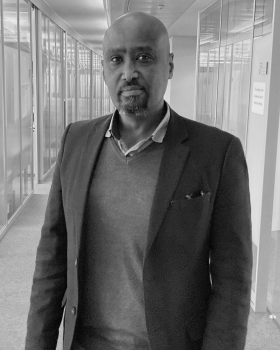
Dr. Daniel Mekonnen
Current affiliation
- Independent Consultant for international human rights law and international refugee law
Hosting institute
Contact
- Email: …
Key expertise
- International Human Rights
- International Refugee Law
- Diaspora & Migration Studies
Profile according to FFVT taxonomy
Fields of research
- Human Rights Research
- Migration Research
- Development Research
- Peace And Conflict Studies
- Governance Research
Scientific topics
- Causes Of Displacement
- Civil Society Engagement
- Health
- Integration And Social Participation
- International Protection
- Refugee Law
- Transnational Networks
Disciplines
- Law
- Criminology
Professional Career
Doctors of Laws (LLD) in Public International Law with focus on “Atrocity Crimes,” University of the Free State 2008
Master of Laws (LLM) in Human Rights, University of Stellenbosch 2003
Bachelor of Laws (LLB), University of Asmara 1998
Relevant publications
- D. Mekonnen, K. Tronvoll . The African Garrison State: Human Rights and Political Development in Eritrea. 2017. James Currey an imprint of Boydell & Brewer.
Research profile
1. Who are you?
I am a Geneva-based Independent Consultant for international human rights law and international refugee law. Most recently, I worked at the Geneva Office of Oxfam International as Humanitarian Affairs Policy & Advocacy Coordinator. In various previous contexts, I served as a researcher, adjudicator, trainer, and grassroots campaigner, thus far living and working in a total of eleven countries (Belgium, Eritrea, Ethiopia, Germany, Hungary, Ireland, the Netherlands, Norway, South Africa, the UK and Switzerland). I maintain continued interest in “Third World Approaches to International Law (TWAIL),” which is a very important analytical framework in mainstreaming inclusive practices in all areas related to problems of exclusion and marginalisation.
2. What was your motivation for applying for the FFVT fellowship? Why Germany?
The opportunity offered by the FFVT fellowship is attractive and favourable for conducting an independent research project. And it is always good to be back to Germany, once more as a visiting researcher, it being a country where I did one of my earlier post-doctoral fellowships, several years back (then in the context of a post-doctoral fellowship from the Alexander von Humboldt Foundation). In terms of my professional aspirations, I have a special relationship with Germany.
3. What do you expect from the fellowship?
Fellowships of this nature are important for networking, first and foremost. They are also important for spending some productive months of researching and preparing for the next cycle of publications in which context research findings can also be tested via formal or informal exchanges with FFVT follows and other colleagues form the network. I expect to spend productive months in Erlangen.
4. What is the focus of your work, and what is innovative about it? What are your planned outcomes and activities for the fellowship period? And how do they relate to your FFVT hosting institution/ the FFVT cooperation project?
I will be working on a research project related to the plight of “climate displaced persons,” with focus on exiting gaps of international law in this regard. I plan to develop a journal article, and conditions permitting I may also share my preliminary research findings with FFVT fellows and my host institute. My research builds on a most recent work I did for another German institute on similar themes (available here). My lived experience of forced displacement (and the “ontological privilege” associated with that) is a very important vantage point for my research and academic aspirations. It is in that context that I also pay particular to my commitment to “cause lawyering,” a form of activism involving the deployment of legal (and non-legal) strategies in challenging exclusion and marginalisation. I believe these are very important themes for the FFVT fellowship and for my host institution, the Centre for Human Rights Erlangen-Nürnberg (CHREN).